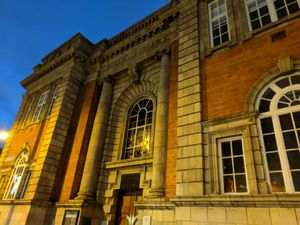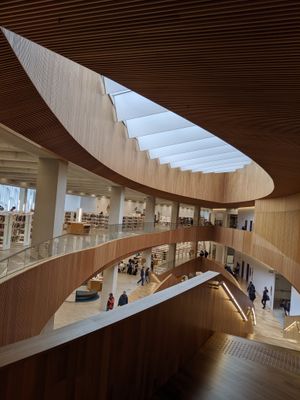Unfortunately, it does not appear to be on the web. The whole eight pages is almost worth quoting!
[Public libraries] matter not because they're part of the the infrastructure of public education, though of course they are that, but because they represent a different kind of education from what you can get in school. They are, in a very specific sense, an instrument of private education: an education in what it means to have a private self. They are public institutions that touch upon the most intimate parts of an emerging personality: the parts from which the ability to rebel against orthodoxy and authority may come. And they offer the prospect that that emergence can continue as long as life itself does. To say that the library offers a kind of private education is not to suggest that the reader who uses it is isolated from the community, or cut off from the surrounding society. On the contrary, what you learn at the library is something almost unique in life: a shared privacy.
The child who begins to borrow books from a library becomes aware at more or less that same time of two things. One is the solitary pleasure of reading, as an arena in which you are free from outside interference. The other is that this pleasure has been and is being experienced by many others in their own way. One of the simple things that a library adds to a book is that white sheet gummed into the inside cover or the title page, stamped with the dates on which other people who borrowed it before you were supposed to return it. In this banal bureaucratic record, there is a lesson to be learned. Books, like their authors, have biographies, they have passed through other hands. The private experience you are having is one that is also shared. ...
One of the great things about borrowing a book was that you got to bring it home, and that the book in itself transformed the house. I grew up in a small, two-bedroomed corporation house, which was inhabited by three adults and five children, so space was at a premium. But a book made the space bigger by opening up private imaginative rooms. .... The fact that a book was borrowed rather than owned added to the excitement, firstly because the book itself was a kind of temporary exotic guest, and secondly because the pressure of time, the awareness of a looming deadline for the return of the book, made you read more intensely. ...
The struggle of libraries since then has been to categorise knowledge in as comprehensive a manner as possible. A library at one level is like an orderly chicken-coop, where the books sit brooding in their neat rows of nests. But every library user, on the other hand, is a fox among those chickens, frightening the established order of knowledge into panic-stricken scatterings. ...
I found the piece particularly affecting for three reasons.
The first personal: I am the almost the same age as O'Toole and grew up a few miles away from where he is writing about, albeit in a larger house! He describes library experiences that are similar to my own, down to the authors read. I worked my way through the Richmal Crompton 'William' books, and the 'Billy Bunter' series in their yellow jackets, and also the 'Jennings' books, which he does not mention. I also promiscuously read the classics alongside myths and legends and popular fiction. Later I worked for several years in those same public libraries, and indeed spent one year actually sticking white labels into the front of books. It was a difficult time for public sector services in Ireland, although I was slightly surprised to see how strongly this was stated "one of the responses of the state in the hard times of the 1980s, when mass unemployment perhaps threatened a degree of social discontent, was to virtually close down the public library service". Given the lack of opportunity in public libraries, and in public institutions generally, I left the Dublin Corporation public library system (now Dublin City Public Libraries) in the late 1980s to work in England.
The second also personal: he captures wonderfully a variety of the things I recognize about the public library, and those public libraries at that time.
The third professional: subtly, and passionately, O'Toole argues for the value of the public library, leading in his closing paragraph to a powerful statement of library purpose:
The library should not provide an argument for a particular case, but demonstrate that there is always another case to be made. The notion that the library is a place that has no agenda other than allowing people to invent their own agendas is what makes it an indispensable resource for a democracy. It is where we can learn not just to be readers, but to be the authors of our own destiny.
Book: The University of the People: Celebrating Ireland's Public Libraries (The Thomas Davis Lectures 2002). Dublin, Pigeonhouse Books, 2003. At time of writing, available from Amazon for the bargain price of $344.
Updates. 04/08/2005 A couple of people have asked me who Fintan O'Toole is. He is an Irish journalist and author, who writes in the Irish Times among other places. 10/27/2023 I fixed a typo and adjusted the sentences about the late 8os for clarity and better flow. I also substituted a Wikipedia link for the Yahoo search (really!) that the author link on this page originally went to. 10/29/2023 Note about book added.
Picture: I took the opening picture of Rathmines Public Library, Dublin.




